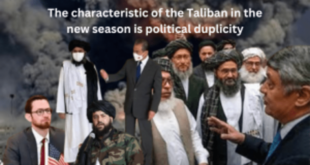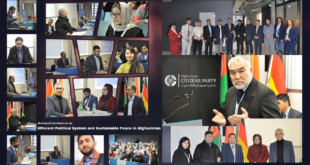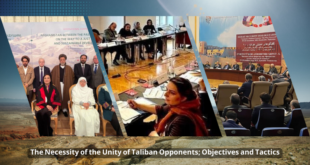Dr. Mahdi Arifi
The parties are one of the institutions, and partisanship is one of the common and prevalent
mechanisms of political endeavor and action in contemporary societies. The existence of such a phenomenon, even within closed political systems, has also been a common occurrence, and its footprint cannot be solely sought in democratic and open societies.Afghanistan has witnessed the establishment and activities of various parties throughout its different periods and political systems. Among them, considering the deeply political nature of the environment and the political activism in Afghanistan, its parties have also had an inherently national nature and functionality. Among the various ethnic groups of Afghanistan, even numerous and diverse parties have emerged within Hazara ethnic over time. With all these interpretations and issues, amidst the abundance and relative plurality of political parties emerging from the Hazara and Shia communities, the establishment of the Citizens’ Party may raise the question both among the general public and especially among the elites: What is the need for another party despite the existence of multiple previous parties, some of which have a long history? This question may be accompanied by another more detailed question in circumstances where political activities for parties, which are supposed to operate within a country to pursue the agendas and goals of political parties, are not feasible within Afghanistan due to the military control of the Taliban regime. In such a situation, one may question the benefits and outcomes of establishing this party and its actions and activities within the country. The first question can also be accompanied by a critical and accusatory perspective, suggesting that the multitude of parties has led to the scattering of the people and the failure to secure the goals and interests of the Hazara community, and even the exploitation of existing parties by others against the interests of the Hazaras themselves. Similarly, the second question and issue may be confronted with the view and criticism that some perceive it as an attempt by members of this party to create an “address” and pursue their own specific individual and group goals.The term ‘address’ has become a common concept during the two decades of democratization and the presence of foreign forces in Afghanistan. It applied to those who sought to establish an address for themselves, as well as those who perceived these addresses as selfish and unethical acts. In order to address such questions and challenges, on one hand, and to attempt to clarify the issue from another perspective, this note will explore the necessity of establishing and operating another party in the political sphere of Afghanistan and elucidate the existential philosophy of the Citizens’ Party of Afghanistan. First, we will delve into the factors and backgrounds that necessitate the establishment of a new and distinct political party.”
The faluire track record of previous Hazara parties
Political parties originating from the Hazara people do not achieve a satisfactory level of success in various aspects of their performance. From the perspective of pursuing and performing tasks properly, establishing an efficient and cohesive party structure, and achieving accomplishments and results, many political activists are not satisfied with the activities of millennial parties.The only party, and specifically in a particular period, that has come close to fulfilling the fundamental responsibilities of a political party on one side and aligning with the ideals, values, and interests of the Hazara community on the other side, and has left a significant positive impact, is the Hezb-e Wahdat-e Islami Afghanistan during the leadership of the martyr Mazari. Indeed, it is precisely for this reason that the Hazara community experiences its most flourishing period in terms of political and social life during that time.
Although, tragic events for the Hazara community during that period, depending on the narrow condition of military and crisis of the country, it is during that short period that the Hazaras establish themselves as an active political group in the transformations and political issues of Afghanistan. They assert their right to participate in decision-making and policymaking for national issues and are not content with anything less than that. Both before and especially after that period, Hazara activists and political parties have failed to fulfill the expected responsibilities as a political institution and as active party representatives of the Hazara community. They have been unable to meet the organizational and operational standards, as well as achieve significant results and accomplishments. They have even failed to maintain and safeguard the achievements of the Hezb-e Wahdat-e Islami led by Martyr Mazari, at the very least. After the Hezb-e Wahdat-e Islami led by Martyr Mazari, Hazara activists and political parties transformed into ordinary players in the political landscape of Afghanistan. They were driven by personal interests rather than representing their community. They pursued their own agendas, seeking personal gain and aligning themselves with those in power, authority, and wealth, neglecting the interests of their own people.
The failure of Hazara political parties is evidenced by intense competition, internal conflicts, and contradictions among them over various issues. This has led to a significant decline in their expectations and effectiveness, reducing their role to mere symbolic and superficial presence within the government. Consequently, the situation for the Hazara people has become extremely unstable and chaotic.The existing political parties among the Hazara community do not have a defensible track record. Politically, they have remained largely detached from the decision-making and policy-making circles.
The individual-centric structure of the previous Hazara political parties.
Another important problem and fundamental challenge that is generally noticeable in the existing Hazara parties is the lack of organizational structure and institutionalized decision-making and policy-making processes. Their activities or inactivities have been primarily centered around a particular individual serving as the party leader, limiting their engagement and approach to addressing issues.Unfortunately, the even more regrettable point is that the leaders of Hazara parties have not been able to internalize the concerns of the Hazara people within themselves and reflect them in their actions and behaviors.The expectations and demands from a “leader” include being able to motivate and inspire members of their group or organization to strive and exert effort. Furthermore, a leader is expected to consistently raise the level of expectations of their members, both individually and collectively. The leaders of Hazara parties not only failed to effectively engage and succeed with the active participation of the people, but they also had very low expectations of themselves and the results of their actions.A leader, in the true sense of the word, possesses special and progressive qualities that can elevate a political activist from a mere “politician” to the level of a “leader.” The absence of these qualities can turn a group or organization under their influence into an unsuccessful entity. From an administrative perspective, the existing political parties associated with the Hazara community have been unable to fulfill their responsibilities in the face of numerous challenges and excessive limitations that hindered Hazara representation in the government and administrative apparatus of the country. Furthermore, from a security standpoint, Hazara-inhabited areas, both nationwide and within the capital, have been the most vulnerable and heavily affected regions, resulting in significant casualties.
Establishing and the existential philosophy of the Citizens’ Party of Afghanistan.
What was mentioned above, regarding the various dimensions and manifestations of the failures of the Hazara political actors in the realm of political engagement and party politics, can be rooted and explained as follows. The shortcomings and the resulting status quo of the Hazara political activists and party leaders can be attributed to several factors and characteristics. Firstly, it can be stated that Hazara political activists and party members have lacked proper awareness and a deep understanding of party politics. What does a party mean? How should it be organized? What goals can be pursued through a party? These and other important questions have not been adequately addressed by Hazara party members. Secondly, they have been primarily focused on seeking personal and party interests rather than the broader values and goals of the Hazara community. Thirdly, their aspirations and desires have been limited by the prevailing circumstances. Fourthly, they have lacked the necessary capabilities and resources to engage in extensive and impactful political activities within the framework of a political party. In this context, the most distinguishing point of the Citizens’ Party of Afghanistan’s existential philosophy would be its ability to offer a new approach in the public sphere and for the governance and administration of Afghanistan. This new approach, which requires a departure from the conventional yet ineffective “politics,” is focused on “governance. Indeed, the administration of public affairs in a country, or “governance,” can be distinguished and differentiated into two approaches: “politics” and “governance. Politics is an approach that lacks ethics or moral considerations. Self-interest governs the minds and actions of everyone. The nature of interaction and relationships between actors and agents in the public sphere is characterized by intense competition and even animosity. In decision-making and policymaking, there is no consideration or commitment to the characteristic of “sustainability” of decisions and the resulting conditions. Everything is sought for oneself and not for others or future generations. In contrast, the approach of “governance” is an ethical and humanistic approach. The pursuit of individual interests is not solely for oneself but is replaced by striving for the fair distribution of resources among all citizens.
The nature of interaction among actors and activists in the public sphere of the country is based on “collaboration.” The decisions and policies adopted in this approach strongly emphasize the characteristic of “sustainability” of conditions and resources, taking into account the interests of others, whether they are present citizens or future generations, at the center of decision-making and policies. In summary, the approach of “politics” is an unethical approach, and more importantly, it is destructive to resources and conditions. The approach of “politics” is not only destructive to resources and conditions but, more importantly, it is also destructive to ethics and undermines humanity. The approach of “governance,” however, is an ethical approach to the governance and management of public affairs and the public sphere of a country. Its governance in any land or country has led to positive transformations and constructive outcomes in various dimensions and domains. The endeavor to establish and implement such an approach of governance in Afghanistan, both in the initial stages of its establishment and in subsequent stages of execution, can be considered as the most significant existential philosophy of the Citizens’ Party of Afghanistan. The understanding of such a distinction and conceptualization of the issue of “statehood” and its division into the two approaches of “politicism” and “governance” can arise and be produced not only from a specific group or intellectual and academic sphere. Another important point is that such an effort to transition from the “politics” approach and its destructive consequences to the “governance” approach, which can open the door to a promising and hopeful future, is expected from a collective and institutional body that exists in a moral and humanistic space and is dedicated to seeking the establishment of citizenship rights for all inhabitants of Afghanistan. The Citizens’ Party of Afghanistan is composed of a group of intellectual elites of Afghanistan as well as individuals who are concerned about the moral and humanistic nature of the public sphere in Afghanistan. On one hand, it strives for a significant and positive transformation in the concept of statehood, and on the other hand, it is concerned with ensuring that the public sphere of the country possesses ethical and humanistic values.
If the continuous absence of these two principles persists and the unethical politics in the country continues, it may not be far-fetched to imagine a time and circumstances where the residents of this land find themselves trapped in a practical impasse. After witnessing the erosion of ethics and humanity, we could ultimately witness the downfall of the country. The founders of the Citizens’ Party of Afghanistan are driven by two concerns: “thoughtful statehood” and “ethical governance of society and the public sphere.” They aim to present a new model of party politics and political activism for the country and the Afghan society.
 حزب شهروندان افغانستان وبسایت رسمی حزب شهروندان افغانستان
حزب شهروندان افغانستان وبسایت رسمی حزب شهروندان افغانستان


